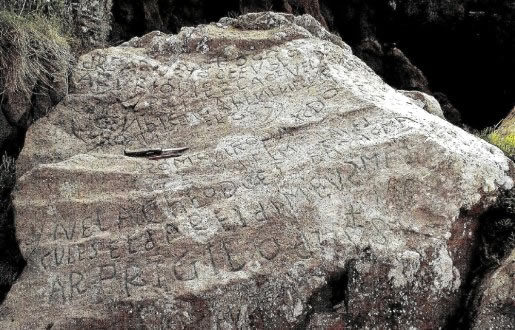It's a carved rock in Bretagne (Britain) in France.
Mysterious inscriptions on a rock: €2,000 for those who can decipher them!
In In Focus, Treasure Hunters & Adventure May 3, 2019 0
The rock of Caro, in Plougastel-Daoulas, Finistère, has inscriptions that have never been deciphered until now.
To solve the mystery, the Town Hall is offering €2,000 to the one who will decipher the "Champollion Mystery in Plougastel-Daoulas" (name given to this enigma, in homage to Champollion, the Egyptologist who translated the Rosetta Stone).
Mysterious inscriptions on a rock: €2,000 for those who can decipher them!
The rock shows a text of about twenty lines ("GROCAR DREAR DIOZEEVBIO" are the first words) and dates :
1786 and 1789 (years that correspond to the construction of the nearby Fort du Corbeau).
1920 (the latter is said to have been engraved by a Russian soldier stationed in the same fort).
Equally enigmatic drawings accompany the text: a heart planted with a cross, a sailboat.
Several questions arise:
Who carved the stone?
In which language or coding?
To say what?
The mystery remains intact....
That is why the municipality of Plougastel-Daoulas has launched a national appeal to linguists, historians, students, academics and other enthusiasts (do you recognize yourself?) to solve the mystery, in the form of a competition that runs from May to the end of November 2019, with a prize of €2,000 (the competition is open to all adults).
The hypotheses will be analysed by a jury, composed of academics and a representative of the Departmental Archaeology Service.
Translated with www.DeepL.com/Translator

De mystérieuses inscriptions sur un rocher : 2 000 € à qui saura les déchiffrer ! - Chasse au trésor
La municipalité de Plougastel-Daoulas a lancé un appel national auprès des linguistes, historiens, étudiants, universitaires et autres passionnés (vous reconnaissez-vous ?) pour résoudre le mystère, sous la forme d'un concours qui se déroule de mai à fin novembre 2019, doté d'un prix de 2 000 €


